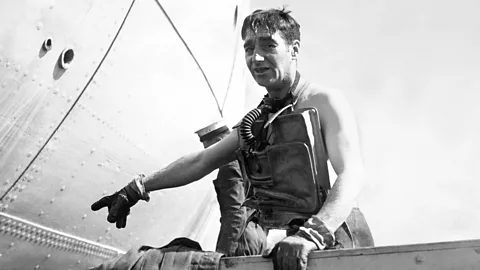'He swam out to the Russian vessel and was never seen alive again': The Cold War spy mystery of the 'vanishing frogman'
 Getty Images
Getty ImagesIn 1956, Royal Navy Commander "Buster" Crabb disappeared in murky circumstances during a visit to the UK by Soviet leader Nikita Khruschev. In 2006, the BBC's Michael Buchanan read the newly declassified files that detailed Crabb's unofficial secret mission – and how the government tried to cover it up.
It was on 9 May 1956, 69 years ago this week, that UK Prime Minister Sir Anthony Eden finally succumbed to press pressure and international embarrassment, and ordered an enquiry into the mysterious disappearance of Royal Navy diver Commander Lionel "Buster" Crabb.
The decorated frogman had vanished during a goodwill visit to the UK by the Soviet leadership at the height of Cold War tensions. When word leaked that Crabb had gone missing, The iralty, the government department responsible for the Navy, issued a vague statement that the diver had been testing underwater equipment at Stokes Bay on the Hampshire coast and was presumed drowned.
But the story fell apart when the visiting Russians accused their hosts of espionage. The Soviets claimed that they had seen a frogman near the Ordzhonikidze – the ship that had brought the Soviet leader Nikita Khruschev to the UK – while it was docked in Portsmouth Harbour. Despite questions being asked repeatedly in Parliament, Eden refused to say more, claiming: "It would not be in the public interest to disclose the circumstances in which Commander Crabb is presumed to have met his death." The government's stonewalling merely heightened suspicions that Crabb had been on a covert spy mission.
Fourteen months after Crabb vanished, a headless, handless body in a diving suit was found by fishermen in Chichester Harbour on the south coast of England. Its lack of fingerprints and teeth made the mutilated body difficult to identify, but a later inquest ruled that it was Crabb. The whole episode publicly embarrassed Eden and wrecked his attempts to develop a more friendly relationship with a post-Stalin Soviet Union.
When he disappeared in 1956, Crabb was well known for his daring underwater exploits. Nicknamed "Buster", after the US Olympic swimmer and actor Buster Crabbe, who had risen to fame in the 1930s, he was an expert in underwater bomb disposal. His bravery during World War Two had earned him the George Medal for removing Italian limpet mines from British warships at Malta, and an Order of the British Empire (OBE) for his mine clearance work at Livorno in Italy. His wartime amphibious adventures would later be fictionalised in a 1958 film, The Silent Enemy, with Crabb being played by Laurence Harvey. And even after he was officially demobbed in 1947, he continued diving for the military in various capacities, including investigating sunken submarines.
An unofficial mission
For decades following the frogman's disappearance, the UK government staunchly maintained its silence on the incident. It would only be from 2006 onwards, when due to Freedom of Information requests by the BBC, and classified documents being made public under the 50-year rule, that the murky circumstances of Crabb's ill-fated final dive began to emerge.
The declassified files showed that, from the start, the UK's security services were keen to use the opportunity of Khruschev's visit to gather intelligence on their Cold War opponents. They suggested hiding microphones in Claridge's hotel, which the Soviet leadership intended to use as their headquarters during their stay. But the prime minister expressly ruled out the idea and made "clear that adventures of a similar nature were forbidden".
Despite this, MI6 recruited Crabb to undertake an "unofficial enterprise" to investigate the Russian ship Ordzhonikidze. The exact nature of his mission is still unclear, but the ex-MI5 officer Peter Wright suggested in his book Spycatcher (1987) that it was to examine and photograph the ship's advanced propeller design.
In History
In History is a series which uses the BBC's unique audio and video archive to explore historical events that still resonate today. window._taboola = window._taboola || []; _taboola.push({ mode: 'alternating-thumbnails-a', container: 'taboola-below-article', placement: 'Below Article', target_type: 'mix' });
